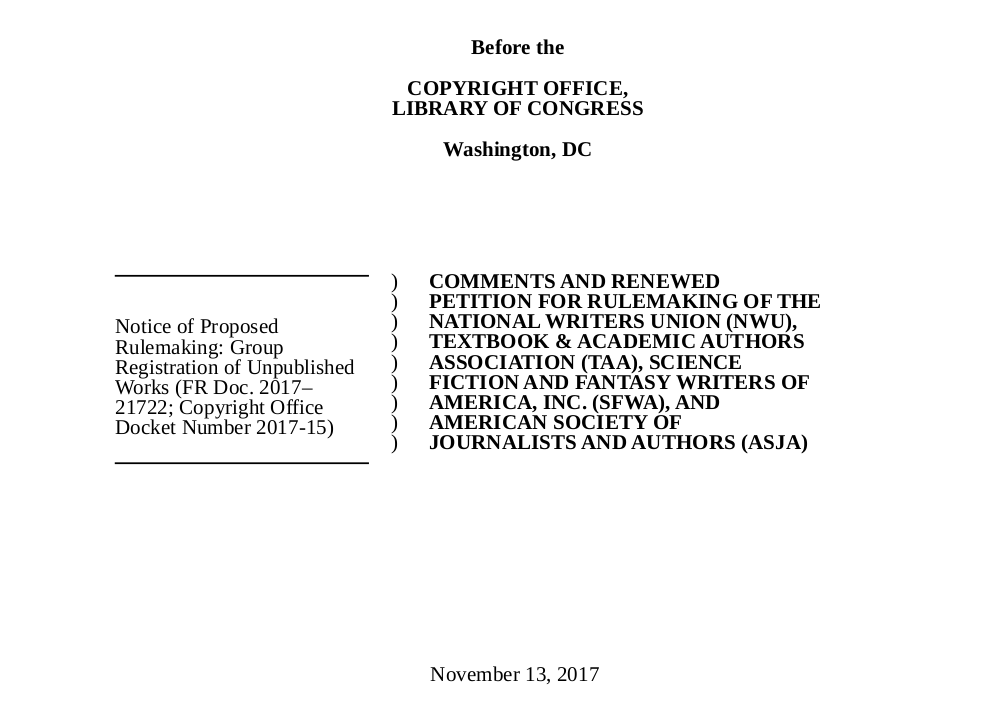
Back in January of 2017, the National Writers Union was joined by three other national organizations of writers in a variety of genres, media, and formats –– the American Society of Journalists and Authors (ASJA), Science Fiction and Fantasy Writers of America (SFWA), and Horror Writers Association (HWA) — in a formal Petition for Rulemaking asking the U.S. Copyright Office to establish procedures for registration of multiple stories, articles, poems, blog posts, or other written works first distributed online or written or published on multiple dates over a 90-day period, for a single fee and with a single application form.
Nine months later, the Copyright Office has yet to act on our petition. Instead, it has proposed making the procedures for “group registration” of multiple articles even more restrictive.
So this week the NWU and our allies renewed our petition and urged the Copyright Office to act on it promptly. We were joined in our Comments and Renewed Petition for Rulemaking by an additional co-signer, the Textbook & Academic Authors Association (TAA). And our petition for rulemaking was explicitly joined and endorsed in a separate filing by the Authors Guild, Association for Garden Communicators, Society of Children’s Book Writers and Illustrators, and Songwriters Guild of America. The SFWA, ASJA, and NWU also submitted additional joint comments objecting to the Copyright Office proposal to narrow the eligibility for group registrations in the current categories to at most five works at a time.
As we explained in this blog post and in our petition, writers are required by Section 412 of the U.S. Copyright Act to register copyright in each of their new works within 90 days. If we don’t register on time, we forfeit eligibility to recover the cost of hiring lawyers to defend our copyrights against infringement, and can’t collect “statutory damages” (the only damages available in typical copyright cases where actual damages are difficult to quantify or prove).
Copyright infringement cases can only be brought in Federal court. “Making a Federal case out of it” isn’t just a figure of speech: The average copyright infringement case costs over a hundred thousand dollars in legal fees! Without being able to recover those fees if you win, it isn’t worth filing a lawsuit against someone — whether a stranger or your former publisher — who is copying or posting your work without your permission.
But current Copyright Office registration procedures require a separate form and a separate fee of at least $35 to register each day’s newly-published work. That means that to register a year of daily updates to a blog, website, or social media feed requires filling out 365 forms, one for each day, and paying $12,775 in registration fees.
We think this requirement for timely registration, combined with the burdensome forms and prohibitive fees, is a “formality” prohibited by the Berne Convention copyright treaty, and precludes the “effective redress” which is guaranteed by the WIPO Copyright Treaty. Repeal of Section 412 of the Copyright Act is one of our longstanding priorities for reform of U.S. copyright law.
But as long as the requirement for timely registration as a prerequisite for recovery of attorneys’ fees and statutory damages remains on the books, it’s critical for that fees and forms for registration not to be prohibitively burdensome. Today, it’s a minor hassle to have to fill out a form and pay $35, plus the cost of sending in a copy, to register copyright in a book. But few, if any, writers can afford the time and expense of registering copy in short-form works, whether “granular” elements of digital courseware, blog posts, flash fiction, or social media feeds (which can be significant sources of advertising revenue in themselves, and even more significant when fragments first posted on social media are later incorporated into published books, articles, stories, or other longer works).
We hope that the growing solidarity of such a wide range of organizations comprised of writers of fiction and nonfiction books, genre fiction, textbooks and other academic works, magazine articles, online content, and all the other types of writing done by NWU members will persuade the Copyright Office to act.

 NWU is the sole provider of IFJ Press Passes to freelance journalists in the U.S.
NWU is the sole provider of IFJ Press Passes to freelance journalists in the U.S.